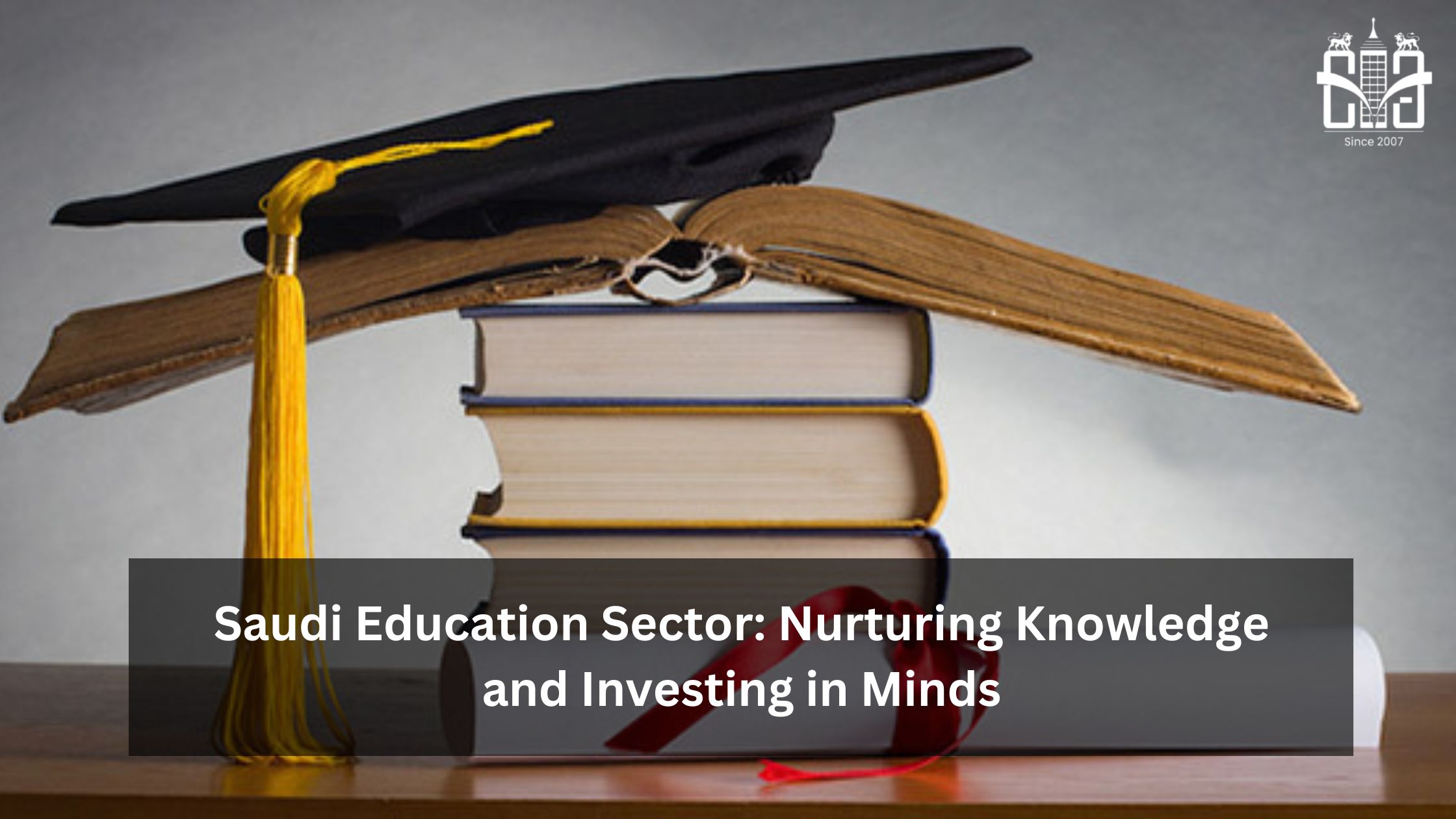
Saudi Education Sector: Nurturing Knowledge and Investing in Minds
The Saudi education sector is a magnet for global investors, as the Kingdom continues to prioritize its citizens' education and promote a knowledge-based economy.
- Introduction
- Overview of Saudi Education Landscape
- Saudi Educational Authorities
- Segments of the Saudi Education Sector
- Public vs. Private Schools in Saudi Arabia
- Simplified Procedures for Education Business in KSA
- Opportunities in Online Learning and Blended Digital Tools
- Saudi Arabian Education Sector: Important Factors for Achieving Success
- Begin Your Education Venture in Saudi Arabia with CIG Saudi Arabia
INTRODUCTION
Saudi Arabia's rise as a global education hub showcases its commitment to nurturing a thriving and dynamic education sector. Saudi Arabia places significant emphasis on its education sector, aiming to cultivate a society driven by knowledge and a workforce that can compete on a global scale. Saudi Arabia's education system encompasses a broad range of academic levels, spanning from early childhood education to higher education and vocational training. Education holds a significant place in Saudi culture, showcasing its dedication to empowering its citizens through the acquisition of knowledge. It is projected that the private education sector in Saudi Arabia will experience a steady growth rate of 11% until 2026.This article delves into the Saudi education system, examining its different segments, the differences between public and private schools, government initiatives, opportunities for foreign investors, and how CIG Saudi Arabia can provide support.
Overview Of Saudi Education Landscape
Saudi Arabia's education sector is at the forefront of transformation, adapting to the changing needs of the 21st century. Saudi Arabia is well-positioned to provide its citizens with the knowledge and skills necessary for success in a swiftly evolving global landscape, as evidenced by its substantial investments, dedication to quality education, and increasing interest in digital learning tools.The kingdom's continued investment in education serves as a beacon of optimism for the prosperity of the nation and its young. In order to enhance the quality of education and prepare students for the challenges of the contemporary world, Saudi Arabia has implemented numerous educational reforms. The following are the primary initiatives:
-
Vision 2030:
Vision 2030 aims to achieve a significant transformation in the Saudi economy and various sectors, including education, by promoting diversification. There is a clear focus on fostering a community that appreciates knowledge and improving the standard of education at all levels.
-
Quality Enhancement:
Enhancing the quality of education has been a top priority for the government, which has focused on teacher training, curriculum development, and infrastructure improvements in public schools.
-
International Collaboration:
Saudi Arabia is highly committed to fostering global partnerships in the field of education. Partnerships with renowned universities around the globe enable the exchange of faculty and students, enhancing the educational environment.
Saudi Educational Authorities:
The Ministry of Education (MOE) is responsible for overseeing and governing the education system in Saudi Arabia. It has a significant impact on shaping educational policies, establishing curriculum standards, and allocating resources to schools nationwide. Furthermore, the Technical and Vocational Training Corporation (TVTC) is responsible for overseeing vocational education, while the Saudi Commission for Health Specialties (SCFHS) governs healthcare-related education.Segments of The Saudi Education Sector :
Pre-Primary and Primary Education:
Saudi Arabia acknowledges the significance of early childhood and primary education in establishing a solid groundwork for students. Considerable efforts have been dedicated to improving the standard of education at this level.Secondary Education:
In Saudi Arabia, secondary education is mandatory and provides students with the option to choose between general and vocational tracks. Students have the opportunity to select from a variety of streams, including science, arts, and vocational, depending on their future career goals.Higher Education:
The kingdom has a strong system of higher education, with many institutions and universities providing a wide range of programs. Reputable establishments in higher education include King Saud University and King Abdulaziz University.Public Vs. Private Schools in Saudi Arabia
Both public and private institutions are included in the Saudi education sector. Public institutions are funded by the government, and Saudi citizens are entitled to free education. They comply with a curriculum that has been standardized by the Ministry of Education (MOE). Conversely, private schools provide a diverse array of curricula and are designed to accommodate expatriate students and those who are interested in alternative educational methods. Although private schools are frequently perceived as having a superior level of quality, they are not without a price tag.In recent years, the partnership between the public and private sectors has been effective, resulting in the establishment, operation, and maintenance of a multitude of educational institutions in the Kingdom's urban and regional areas. This successful partnership has resulted in the establishment of 120 institutions in Madinah and Makkah, which can accommodate more than 102,000 students.
Simplified Procedures For Education Business in KSA
A new branch of the Saudi Business Centre has been established at the Ministry of Education Headquarters in Riyadh with the primary objective of facilitating investments in the education sector. The objective of this center is to increase the availability of investment opportunities in real estate that are designated for educational purposes and to make them accessible to the private sector through the "FURAS" investment gateway in the various Saudi cities.Additionally, the center works in close partnership with relevant authorities to provide over 750 government services, thereby simplifying the process for investors, both domestic and international, to establish and manage their economic ventures. One noteworthy initiative entails the simplification of licensing procedures and requirements for economic activities associated with education, thereby bolstering the private sector's critical role in the educational environment.
Opportunities in Online Learning and Blended Digital Tools
Embracing the digital era, Saudi Arabia acknowledges the potential of online learning and integrated digital tools to improve the quality and accessibility of education. The following are the primary opportunities:- E-Learning Platforms:The adoption of online learning platforms was expedited by the COVID-19 pandemic. Numerous online courses have been made accessible to students through partnerships with platforms such as Coursera and institutions such as the Saudi Electronic University.
- Blended Learning:Numerous educational institutions have implemented blended learning, which integrates conventional classroom instruction with online resources and tools to generate personalized and interactive learning experiences.
- EdTech Startups:The government is actively involved in the support of EdTech firms that are developing innovative educational technologies and solutions, thereby contributing to the modernization of the education sector.
Saudi Arabian Education Sector: Key Considerations for success
There are numerous factors that require meticulous consideration for private institutions that are interested in entering the Saudi Arabian education sector. These consist of:- Incorporation: It is important to have a clear understanding of the business registration process, carefully choose a suitable location, identify the core age demographic to target, comply with legal requirements for incorporation, and obtain the necessary regulatory approvals.
- Funding & Finance: Evaluating the financial resources needed for the initial incorporation and ongoing operations in Saudi Arabia. One possible approach is to assess the benefits of creating partnerships or exploring mergers, while also conducting thorough feasibility and due diligence assessments. Additionally, it may be necessary to establish banking arrangements across the country..
- Real Estate: Grasping the intricacies of land laws, fulfilling development and leasing requirements, and navigating musataha agreements with government entities and developers to secure appropriate locations.
- Construction and Infrastructure: Ensuring adherence to construction regulations, establishing and maintaining new campuses, and meeting student accommodation needs.
- Employment: Ensuring compliance with Saudization requirements, preparing employment contracts, reviewing human resources policies, and adhering to employment laws to effectively manage your workforce. Let CIG Saudi Arabia handle your employee management so you can concentrate on your growth strategies.
- Technology: Acquiring technology infrastructure, investigating outsourcing arrangements, and setting up licensing agreements to support your educational initiatives.
Our experienced consultants are here to guide you every step of the way as you embark on your education venture in Saudi Arabia. We provide comprehensive assistance with legal and regulatory requirements, helping you navigate licensing procedures and facilitating the expansion of your business. Having a comprehensive grasp of the local educational ecosystem, we are well-equipped to assist you in smoothly entering the Saudi education sector.









